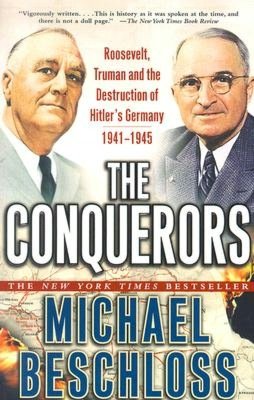My book club recently discussed 1938: Hitler's Gamble by Giles MacDonogh. I previously posted on the book and on the discussion. One thing we could not understand is why other countries stood by while the Nazis became more and more brutal in the treatment of the Jews (eventually culminating in the Holocaust).
I am now reading The Conquerors: Roosevelt, Truman and the Destruction of Hitler's Germany, 1941-1945 by Michael Beschloss. A part of the book discusses the way that Roosevelt and his administration dealt with the problem, and in passing with some of the other allied powers with which the Americans were negotiating. Stalin's USSR seemed totally uninterested, perhaps not surprising in a regime that would sacrifice millions of its own people in gaining and holding political power, restructuring its agriculture, and fighting the German invasion. The British seemed divided over the issue.
Beschloss recognizes that antisemitism was pervasive in the United States, and that it was difficult for Americans to recognize that the Nazis would embark on an unprecedented crime against humanity. Leaders of the American Jewish community worked to gain administration support to save European Jews, but ran into apathy and other priorities.
The book portrays Henry Morgenthau, Roosevelt's Secretary of the Treasury, as a secular Jew (reluctant to be seen by his Christian colleagues as "too Jewish:) who was slow to raise the issue with FDR, perhaps in fear of weakening his personal relationship with the president. It was Christian subordinates of Morganthau who became seized with the horror of the Holocaust and convinced Morganthau to go to the president and call for action. That intervention resulted in a new program in 1944, too late but still a program credited with saving some 200,000 lives.
General Eisenhower and Secretary of War Stimson are pictured as not wanting to divert military resources into dealing with civilian refugees (a position that mirrors that of Northern generals in the Civil War). John McCloy, Assistant Secretary of War, noted that there had been stories of German excesses during World War I which eventually proved to be false; he wondered if the stories of Nazi atrocities were similarly inflated.
Breckenridge Long, an Assistant Secretary of State, is depicted as opposed to immigration, especially of Jews; he is portrayed as deliberately slowing the flow of visas, money and assistance to the European Jews. Cordell Hull is portrayed as backing up his subordinate, having delegated the relevant authorities to him.
Roosevelt is depicted as having a laser-like focus on winning the war through military means. He failed to order bombing of the railroad tracks used to transport Jews to extermination camps, and to bomb the camps themselves to destroy the gas chambers (and thus save those who would be killed in them later in the war). He was insistent (as was Stalin) of unconditional surrender by the Germans, feeling that World War II grew out of the negotiated peace that ended World War I (as well as the harsh treatment of the Germans in the Treaty of Versailles). It was only in 1944 that he began to warn Europeans that there would be war crime trials and approved the creation of the War Refugee Board.
I would note that Roosevelt faced elections in 1940 and 1944. The 1940 election was for an unprecedented third term, at a time when the United States was still suffering from the Depression and was unprepared for a war that Roosevelt felt must be won. In 1944, the nation was fully committed to the war and there was "light at the end of the tunnel". In both elections, Roosevelt wanted Jewish support but wished to avoid loss of support from antisemitic and anti-immigration voters.

3 comments:
We forget, postwar, that antisemitism was a fairly mainstream and widespread thing even before Hitler got into it. It's one of those old attitudes, like ideas about inferiority of blacks, women or asians, that was ubiquitious and unquestioned at times in the past. It's hard to make the leap now to see how people with those ideas saw the world, when we ourselves find those perspective abhorrent to the point of criminality. While it's true nobody believed the Jews about the extent of what was being done, it's equally very true that nobody much liked them either at the time, so it was easy to let it slide.
A lot of those old attitudes are still around. Look at the anti-Japanese demonstrations in China and Korea, the anti-American demonstrations in Muslim countries, the Palestinian and Israeli feelings about each other, and the clashes between Christians and Muslims across Africa. That is not to mention genocide in Rwanda, Burundi and Kosovo, or the ethnic cleansing that has taken place in Iraq. My congressman this month publicly expressed his bias against German-Americans. We have to keep battling hate and prejudice.
Would bombing railroad tracks and gas chambers have saved lives? Would the use of bombers for that purpose have delayed the defeat of Germany? Of course we will never know. But the outcome would have depended on the response to the bombing. I could imagine Hitler's government concluding that the "final solution" was more important that other considerations and consequently diverting resources to the Holocaust, even in the face of opposition, speeding up the schedule. I would guess that there is a small probability that bombing to save Jews would lead to more Jewish deaths and a shorter war. Counter factual arguments are always risky. So are efforts to understand what is in the mind and heart of a decision maker.
Post a Comment